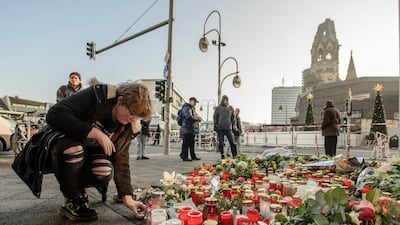DUBLIN // In the wake of the Christmas market attack in Berlin, Germany finds its state-driven openness towards refugees and migrants severely tested, especially as the country heads into a major federal election next year.
Under Chancellor Angela Merkel, who will be running for her fourth consecutive term in office, Germany took in more than a million refugees in 2015 and 2016, most of them from war-ravaged Syria and Iraq.
But Monday’s attack, in which the assailant drove a lorry into the Christmas market killing 12 people and injuring 48, places Mrs Merkel’s policy under significant pressure.
The Tunisian suspect Anis Amri, who entered Germany in July 2015, has a lengthy criminal record and was denied asylum earlier this year.
The attack is the fourth and most violent incident carried out by a Muslim refugee or immigrant in Germany this year.
Mrs Merkel acknowledged that, if the Berlin assailant was indeed proven to be a refugee, “this would be extremely hard for us to bear… [It] would be particularly repugnant for all those Germans who toil daily to help refugees.”
The Chancellor’s political opponents on the right — including anti-immigrant parties such as Alternative for Germany (AfG) and the National Democratic Party (NDP) — have been quick to blame her policies for the Berlin attack.
“The milieu in which such deeds can thrive has been created through negligence in the past year,” Frauke Petry, the leader of AfG, said in a Facebook post on Tuesday.
“This case is not an isolated incident… The Christmas market was not a random target. It’s not just an attack on our freedom and our way of life, but also on our Christian tradition,” he said.
“Germany is not safe anymore. It would be the duty of the chancellor to tell you this. Since they won’t do it, I will.”
On Twitter, another AfG politician Marcus Pretzell, went further, calling the victims of the Berlin attack “Merkel’s dead”.
Mrs Merkel’s open-door immigration stance also came under attack from French politician Marine le Pen, the leader of the right-wing National Front in France. The French town of Nice experienced a similar attack in July, when a Tunisian man killed 86 people when he ploughed a truck into a crowd.
“The outrage is very strong: How many massacres and deaths where Islamist terrorists are involved will be necessary for our governments to stop bringing a considerable number of migrants into our countries?” Ms le Pen questioned.
Gauri Khandekar, the deputy director of the Brussels-based Global Relations Forum, a foreign policy think tank, noted that, over the past year, the AfG has already made some inroads into the electorate — a sign that its position against immigration is finding some support.
In September’s regional elections in Mecklenburg-Western Pomerania — Mrs Merkel’s home state — the AfG earned 21 per cent of the votes, coming second behind the centre-left Social Democrats, who polled 30.6 per cent. Crucially, the AfG beat Mrs Merkel’s Christian Democrats in those polls.
"Their main line of opposition is to Merkel's open-door policy towards refugees, with a shift towards anti-Islam rhetoric," Ms Khandekar told The National.
Mrs Merkel has, over the past few months, shifted course perceptibly with regard to migrants and refugees in Germany.
In October, she called for swifter deportations of foreign nationals with no permission to reside in the country. The same month, the head of her government’s federal office for migration and refugees argued that other European countries had to take in their fair share of refugees, saying: “They can’t all come to Germany.”
Far fewer refugees have arrived in Germany this calendar year — just over 200,000 compared to the 890,000 who were permitted to enter in 2015.
Addressing a party conference two weeks ago, Mrs Merkel promised that she would not allow migrants to flood into Germany again as they did in 2015.
She also spoke in favour of banning the full-face veil for Muslim women, even though her party had rejected such a ban last year.
“Here we say: ‘Show your face.’ So full veiling is not appropriate here,” she said. “It should be prohibited wherever legally possible.”
Still, Ms Khandekar said, the sort of discontent that led to the vote for Brexit in the UK in June or the election of Donald Trump to the presidency in the US is missing in Germany.
“The main grievance that has fuelled [shifts] in America and other countries, ie economics, is missing,” she said. “Germany is doing well economically, and most Germans are happy about their country’s leading role in Europe.”
“If the Christian Democrats — as Merkel has accepted — propose a more controlled migration policy, all could be well.”
ssubramanian@thenational.ae

